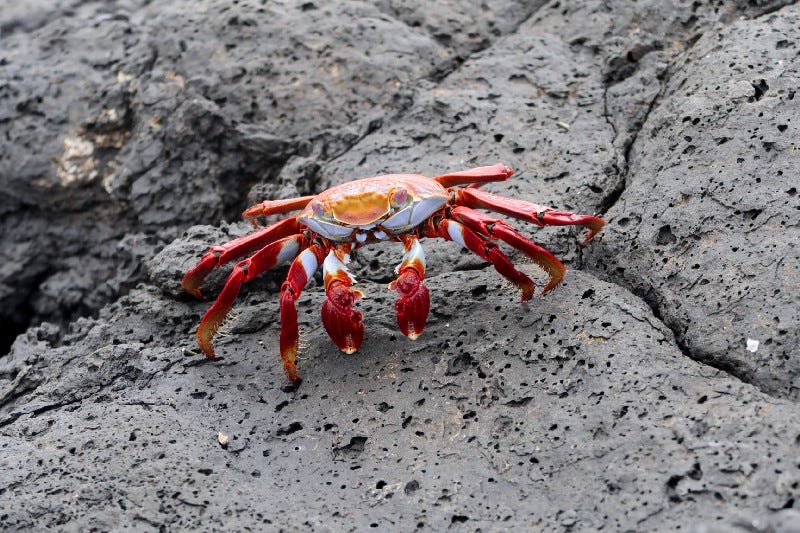
Our capitalist system is blind to pretty much anything other than money. That’s why it is so difficult to get the system to change. Dire warnings about polar bears and the Great Barrier Reef, for example, lead only to sad memories and empty exasperations that, “Someone should do something!” Maybe finally, we are beginning to see real financial impacts that will catch attention — the Alaskan snow crab harvest has been canceled.
As CNN reported: “The snow crab population shrank from around 8 billion in 2018 to 1 billion in 2021, according to Benjamin Daly, a researcher with the Alaska Department of Fish and Game.” That’s why they canceled the season. Read that again… From 8 billion to 1 billion in three years. An 87.5% drop. That is a catastrophic collapse of a population.
Why is it happening? Because snow crabs live in frigid waters at less than two degrees Celsius. The Bering Sea is warmer than that now. Snow crabs cannot live in the warmer water.
Just like humans cannot live in the hotter, more humid air.
From 8 billion to 1 billion in three years. Canceling the season for harvest. Less crab. Higher prices. Businesses shut down. That’s real economic damage. It should be getting people’s attention.
Other climate catastrophes play out in different ways in different ecosystems. Fires, hurricanes, floods… They are all real, but they are events. They stop. They go away. They end.
But this population collapse is stunning in a way the other events are not. Three years. From 8 billion to 1 billion because the temperature of the water changed a few degrees. And that change is not going to end. Just like our rising global temperatures are not going to end.
Where have we heard the dire warnings of a few degrees of change before? Yes — from scientists about human survivability on the planet. While some talk about average temperature increases, the real focus for human beings is wet bulb temperature — that point where the human body can no longer cool itself by evaporating sweat. When we are outside in the heat on a very humid day, we sweat a lot but can’t cool down because the wet bulb temperature is too high. In other words, we cannot survive outside.
The snow crabs’ ambient water temperature has moved to a level where they cannot survive. Our ambient air temperature and humidity are moving to a level where humans cannot survive.
For the crabs, it was water temperatures above two degrees Celsius. The wet bulb temperature in which humans cannot survive is 95 degrees Fahrenheit — a wet bulb temperature at that level for an extended time makes a place uninhabitable. Just like the snow crabs’ water.
Remember the numbers? There were 8 billion snow crabs a few years ago. Guess how many humans are on the planet now? About 8 billion. A global increase in wet bulb temperature conjures a terrible image: A collapse in the human population from 8 billion to 1 billion, maybe in a similar three-year period. Just like the snow crabs.
Places with high humidity are at particular risk — that is, places like the southeastern US, the Mediterranean rim, eastern south Asia, and all Pacific Island countries. As wet bulb temperature increases, these places become uninhabitable outdoors, and inhabitable indoors only with sufficient cooling infrastructure.
However, the problem is not only about human habitability. Most land-based animals have similar wet bulb temperature thresholds as humans, so while humans can escape to an indoor cooling center, animals cannot. Entire ecosystems will inevitably collapse.
I hate writing these gloomy articles, but I am doing so to point out these parallels. Snow crabs likely started dying in small areas where the water got too warm. They probably thought they were occasional, outlier events. Then those areas grew. In three short years, 87.5% of the population was gone. For humans, wet bulb temperatures are on the rise. The threshold of 95 degrees Fahrenheit, beyond which people cannot survive, has been measured for short periods several times since 2005. It is becoming more and more common. So far, they are outlier events. I’d like to think that the disastrous economic impact would get the attention of capitalists. I fear it won’t. And if it doesn’t, we will be the snow crabs soon.
—Anthony Signorelli



